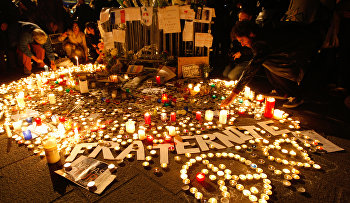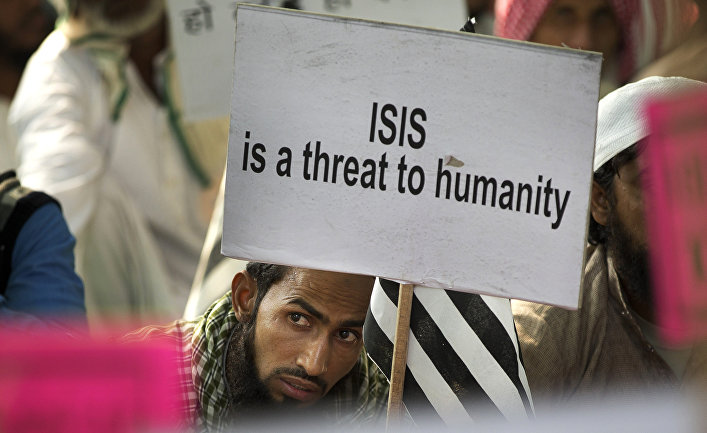The Paris terror attacks are tragedy in which more than 120 people lost their lives last Friday. Responsibility for the attacks was assumed by ISIL – which in turn names the western coalition, including France and the US, as a bunch of crusaders. The terror attacks were vengeful retaliation for bombings of ISIL controlled territories. If we factor-in the destabilization of European society which has been caused by the inflow of Islamic refugees from the Middle East, such large-scale attacks may provoke social melt-down and hatred. The international community continues its war on terror – yet what is now the largest post-war terrorist attack in Europe may cause a strategy rethink.
ISIL will attack again / refugee problem / destabilization of Europe
In September France took part in air strikes on ISIL's positions in Syria. To avoid breaking international law, France's attacks on Iraqi territory were carried out with an Iraqi government mandate. In the beginning of attacks on Syria, France strode deeply into the military action against ISIL. Within the western coalition, France is ranked in second place after the US, and thus incurred the dire wrath of ISIL and its supporters. In 2013 France undertook military actions in Mali, putting down Islamic terror organizations. As then-President of the European Union, Poland's Donald Tusk said at the time — France was leading the war on terror.
These attacks have shaken France's leading international position. It's very likely that ISIL meticulously preplanned the attacks in order to carry them out over exactly these dates. On 30 November Paris is hosting the COP21 international climate conference, which has involved France in enormous organizational outlay. It looks strongly as though the attacks were an attempt to force the French authorities to reshuffle their cards. Moreover, 15 November saw the opening of the G20 nations summit in Turkey. ISIL's intention has been to show what it's capable of — by way of a major terror atrocity.
ISIS will become more deadly before it dies: https://t.co/kX0v3EGDxq pic.twitter.com/8HLhnuXm93
— Slate (@Slate) November 18, 2015
President Hollande has said that the terrorists are trying to sow chaos, and to terrify the French population. The French president believes that terrorism does not just destabilize the government, but society as a whole. There has been media speculation that the date of Friday 13 was chosen due to its legendary 'unlucky' associations in the Christian world.
“This is only the beginning of the attacks.” ISIL insist on their responsibility for the attacks. The Islamists have warned that they will not stop at this. Terror attacks which cause appalling loss show that the organization has begun its terror activities beyond the borders of its own sphere of influence.

In June 2014 ISIL pronounced the creation of a nation, based on the territories under its control in Iraq and Syria. The terrorist group then demanded that its supporters relocate themselves within the controlled area – to bolster its economic and military activities. However, last summer the western coalition began its campaign of air sorties against ISIL, prompting terrorists to expand its wars to the territories of its foes – the USA, and so on. It seems very likely that the organization has now changed tactic, and decided to target its attacks beyond the boundaries of its sphere of influence.
ISIL has made it clear that it shoulders direct responsibility for the recent terrorist attack in Beirut, which killed 43 people. Meanwhile expert opinion is gathering that the Russian airliner which crashed in the Sinai peninsular of Egypt in late-October was downed by a terrorist operation organized by ISIL-loyal operatives. The Egyptian political correspondent Kamar Habib has commented that “since pressure has been growing on ISIL in the areas it controls, the organization is planning counter-attacks to broaden its terror activities beyond its sphere of influence. There is a strong risk that the West and Russia will see numerous attacks.”
BREAKING: #ISIS posts photo claiming to be the improvised explosive used to bring down Russian plane pic.twitter.com/zRkQebogkP
— Conflict News (@Conflicts) November 18, 2015
These terrorist attacks have resounded in an atmosphere of increasing destabilization of society in Europe, caused primarily by a massive inflow of refugees from the Middle East. More than 540,000 migrants are calculated to have arrived within Europe. The German Chancellor, Angela Merkel – the leader of the country which has born the brunt of the refugee arrivals – has said that “this terrorist attack is directed against us all.” After the attacks, French President Hollande ordered a border control crackdown. France is a member of the 26 nations who have formed a border union for passport-free travel within the area covered – the Schengen Zone. Hollande's crackdown is unprecedented. Its aim is to prevent would-be terrorists crossing the border. To staunch the flow of migrants, Hungary closed its borders. Germany, too, is stepping up its border-control procedures. At the end of October, routine elections in Poland resulted in a change of government. As AFP reports, Poland's new FM, Konrad Szymanski announced on 14 November that Poland is unwilling to accept its EU-allotted quota of migrants. The EU worked for many years to get rid of borders altogether — but the Paris attacks have left the EU tied up hand and foot.
“ISIS wants us to think refugees are the enemy,” Madeleine Albright says https://t.co/JG92yU0Jnx
— TIME.com (@TIME) November 18, 2015
The leader of France's ultra-right nationalists, “Front National” – a party which opposes both the EU and immigrants – is delighted to see border controls strengthened. Opinion polls conducted in Germany show improved approval ratings for parties who make their opposition to immigration known. Germans are worried about the policy of taking in refugees. There is a strong risk that terror attacks will prompt a fresh wave of intolerance in Europe.
The beginning of the week could see chaos on the financial markets.
Financial market experts fear the effect that the terrorist acts may have on world markets. Recently share prices have been up all over the world. However, some experts are now repeating the mantra that “at the beginning of the week there could be chaos and falling share prices, as market players struggle to understand how to avoid risks.”
“The main loser in these attacks has been France, whose economy is ranked number two in Europe after Germany. It might go as far as leading to stagnation on the markets,” said Japan's Daiichi Seimei Economic Research Institute chief economist Osamu Tanaka.
By the close of last week the Nikkei Index stood at 19596 points. However, SBI analyst Nariuki Fujimoto commented that “any kind of international destabilization would be negatively reflected on the markets. There's a strong possibility the Nikkei might take a dive below the 19000 mark.” Markets are also concerned that the locations of terror attacks might take turns. NLI Research Institute chief economist Koji Yajima says that “if the next attack target is the US, with its pre-eminent economic position, this will have the direst consequences for world trade.” During the G20 Summit, which took place in Turkey over 15 and 16 November, delegates discussed the problem of the influence of terrorism on the world economy. Will world leaders be able to give a clear signal to the markets?






